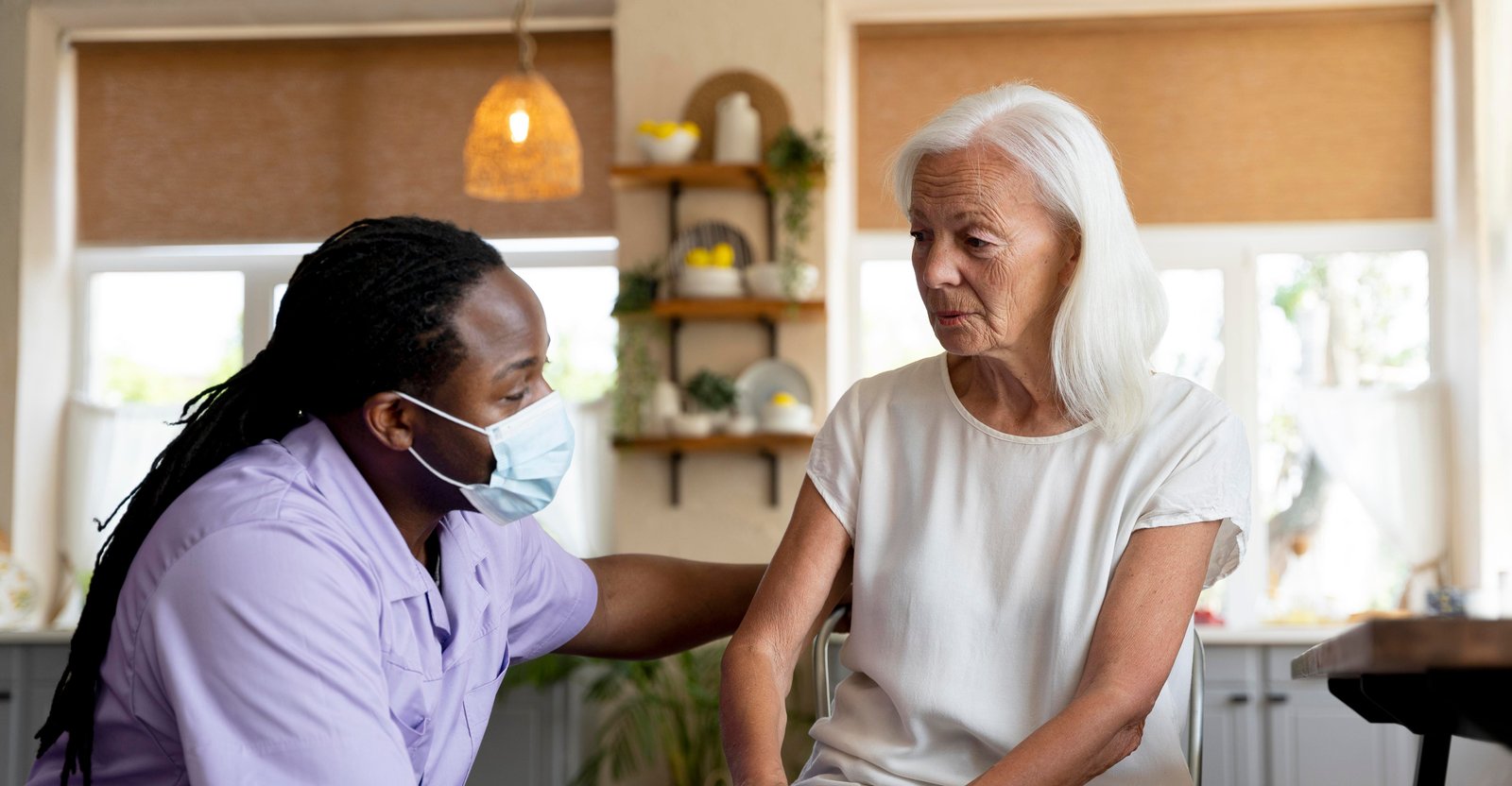
There is a great need for home care services. As they get older, more people prefer to remain in their own homes. Caretakers with professional training enable this. They assist with personal care, everyday chores, and medical needs.
Seniors can remain comfortable and independent as a result. Families may relax knowing that their loved ones are receiving quality care.
Why Choose Professional Home Care?
Peace of mind is provided by professional home care. It guarantees the highest quality of care for your loved ones at home. To manage a range of demands, caregivers receive training. They offer assistance where it’s most needed, from personal cleanliness to medication management.
Families don’t need to worry when they get expert assistance.
They are certain that their loved one is secure and at ease. Home care is about providing dignity and security, not just help.
1. Expertise and Experience in Care
Trained and Certified Caregivers
Caretakers with specialized training and certification are employed by professional home care providers. This guarantees that they offer people with a variety of medical demands top-notch service.
They may provide individualized support, ensuring that all personal and medical needs are satisfied, and they are aware of the challenges involved in managing chronic diseases.
Handling Complex Medical Needs
Complex medical duties including wound care, physical therapy, and pharmaceutical administration can be handled by qualified specialists. They have the tools necessary to keep an eye on and modify therapies, guaranteeing the greatest results for people with persistent health issues.
2. Personalized Care Plans
Custom Care Tailored to Individual Needs
Based on the health and lifestyle of each senior, professional caregivers develop individualized care plans. To promote complete well-being, these plans are made to cover social and emotional needs in addition to physical health.
Flexibility as Needs Change
Home care services, as opposed to traditional care facilities, provide flexible care plans that change to meet the requirements of the elderly. The care plan is modified as their health improves or deteriorates, guaranteeing they get the proper assistance at every turn.
3. Ensures Safety and Prevents Accidents
Home Safety Monitoring
To find and remove safety risks, experts evaluate the home environment. To prevent falls, particularly for elderly people with mobility impairments, this involves fastening carpets, adding grab bars, and enhancing lighting. To assist lower the chance of accidents, they make living spaces safer.
Supervision and Support
When performing daily tasks like eating, walking, or taking a shower, caregivers provide monitoring. Preventing accidents and guaranteeing senior safety, assures families that their loved ones are supported throughout the day.
4. Emotional and Social Support
Combating Loneliness
Physical help is only one aspect of home care. Professional caregivers lessen emotions of isolation and loneliness by providing much-needed emotional care. They converse, offer company, and assist the elderly in maintaining ties to the community.
Building Meaningful Relationships
Strong, dependable relationships grow over time because caregivers frequently collaborate with the same people. Seniors who experience this continuity feel more supported and at ease in their own homes, which improves their emotional security and quality of life.
5. Access to Skilled Health Care
Health Monitoring and Professional Medical Support
Skilled medical assistance from therapists or licensed nurses is part of professional home care services. They make sure seniors receive the proper care at the appropriate time by helping with physical therapy, keeping an eye on vital signs, and managing prescriptions.
Faster Recovery and Fewer Hospital Visits
Seniors who receive home care frequently recover more quickly. Better long-term health outcomes and time and financial savings can be achieved by preventing needless hospital stays and re-admissions with continued professional care.
6. Involving Family in Care Decisions
Active Family Participation
Family participation in care decisions is encouraged by professional home care. Families can rest easy knowing that their loved ones are receiving the proper care thanks to this transparency. It also keeps everyone informed and on the same page regarding the aims of treatment.
Care Coordination
To create a thorough care plan, home care workers collaborate closely with family members and other medical specialists. This helps prevent gaps or misunderstandings in care and guarantees that every facet of the senior’s health is addressed.
7. Comfort of Staying at Home
Familiar Surroundings Promote Better Health
Seniors can remain in a familiar setting at home, which has been demonstrated to enhance health outcomes. Routine, familiarity, and comfort all lead to improved mental and physical health and stress reduction.
Independence and Routine
Seniors can preserve their habits and experience greater independence with in-home professional care. As people continue to live according to their terms, this consistency promotes their mental well-being and raises their standard of living.

8. Affordable Alternative to Nursing Homes
Cost-Effectiveness Compared to Institutions
For people with less urgent care needs, professional home care is frequently less expensive than assisted living or nursing homes. It enables families to get high-quality care while controlling expenses.
Pay Only for the Services You Need
Professional home care lets you pay for precisely the services your loved one requires, unlike more extensive care facilities where you pay for a whole range of offerings. With this flexibility, you can better control your care expenses and avoid paying for treatments you are not needful for.
9. Enhanced Quality of Life
Better Emotional Wellbeing
Being able to stay at home helps one to have a better quality of life. Seniors reduce stress by being in a familiar environment surrounded by people they know, therefore improving their emotional state.
Encouraging Activity and Engagement
Social contacts and physical activities are facilitated by professional caregivers. These help elders stay active and involved in their community by preserving their mental and physical well-being.
10. Peace of Mind for Family Members
Trust and Reliability
Knowing that their loved ones are under good care helps families to relax. They may relax knowing their loved one is in good hands and receiving the greatest treatment even while they focus on their own life and responsibilities.
24-hour Care Availability
Some home care agencies offer flexible schedules including round-the-clock care. This ensures family members, whatever the time of day or night, may relax knowing their loved one is always safe and well-cared for.
Conclusion:
Seniors can stay in their homes with the safety, emotional support, and customized care professional home care offers. By encouraging camaraderie, reducing accidents, and enhancing health, trained caretakers help to increase the general quality of life.
For your loved ones, think about hiring a professional home care provider. To find out more and schedule a consultation, visit JGC Healthcare right now. Allow us to assist you in giving the best care possible at home.
FAQ’s:
1. Hiring a qualified home care firm offers what benefits?
expert home care services provide individualized attention, safety, and expert support that lets seniors comfortably stay in their homes.
2. How can home care guarantee the safety of my loved one?
Home care workers assess the home environment, minimize risks, and provide supervision to help prevent accidents and injuries.
3. Are qualified caregivers able to carry out medical obligations?
Indeed, qualified caregivers can assist with therapies, medical check-ups, medication management, and overall treatment to offer thorough care.
4. How might home care services help with loneliness?
Professional caregivers offer company, conduct long chats, and strengthen emotional ties to help reduce feelings of loneliness.
5. Does home care cost less than assisted living homes?
Home care can be more affordable than institutional care, allowing households to pay for exactly the services they need.
